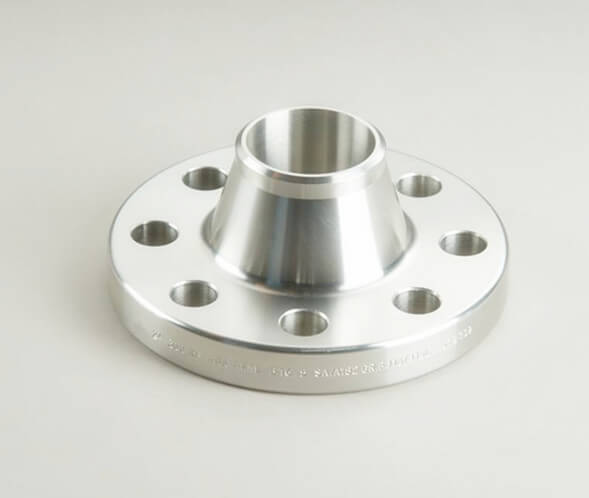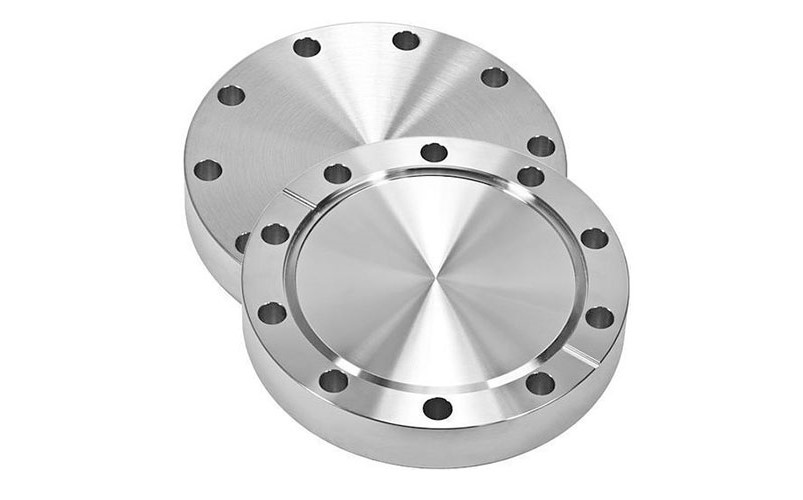Understanding the Different Types of Alloy Steel Flanges
Alloy steel flanges come in various types, each with its unique features and specifications. Understanding the different types of flanges available is the first step in choosing the right flange for your project.
The most common types of Alloy steel flanges include Weld Neck, Slip-On, Blind, Socket Weld, Lap Joint, and Threaded flanges.
Weld Neck flanges are designed to provide a long-lasting and leak-free connection. They're commonly used in high-pressure piping systems and have a neck that's welded to the pipe, creating a smooth transition between the pipe and flange.
Slip-On flanges are easy to install and remove and are ideal for low-pressure systems. They're slipped over the pipe and then welded in place.
Blind flanges are used to close the end of a pipe or vessel and are commonly used in systems that require periodic inspection or cleaning.
Socket Weld flanges are similar to slip-on flanges but have a socket in the bore to allow the pipe to be inserted. They're commonly used in small-bore piping systems and have a high-pressure rating.
Lap Joint flanges are designed to be used with a stub end and are ideal for systems that require frequent dismantling. They're commonly used in low-pressure systems.
Threaded flanges have internal threads and are screwed onto the pipe. They're commonly used in low-pressure systems and are easy to install and remove.
Factors to Consider When Choosing Alloy Steel Flanges
Choosing the right Alloy steel flange for your project requires careful consideration of various factors. Here are some of the critical factors to consider when selecting the right flange for your project.
Pressure Rating and Temperature Requirements
The pressure rating and temperature requirements are essential factors to consider when choosing Alloy steel flanges. The pressure rating is the maximum pressure that the flange can handle, while the temperature requirement is the maximum temperature that the flange can withstand.
It's crucial to select a flange that can handle the pressure and temperature requirements of your project. Failure to do so can result in leaks, damage to equipment, and even safety hazards.
Size and Dimensions
The size and dimensions of the flange must be compatible with the piping system. The size of the flange is determined by the size of the pipe to which it's connected. It's essential to select a flange that matches the size of the pipe to ensure a secure and leak-free connection.
The dimensions of the flange, such as the bolt hole diameter, thickness, and outside diameter, must also be considered. The dimensions must match the piping system and other components to ensure a proper fit.
Corrosion Resistance and Material Selection
Alloy steel flanges are known for their excellent corrosion resistance, making them ideal for use in harsh environments. However, not all Alloy steel alloys offer the same level of corrosion resistance.
The material selection is critical when choosing Alloy steel flanges. Factors such as the type of fluid or gas being transported, the temperature, and the level of corrosiveness must be considered.
Some of the most commonly used Alloy steel alloys for flanges include 304, 316, 321, and 347. It's essential to select the right material for your project to ensure corrosion resistance and longevity.
Flange Face and Surface Finish
The flange face and surface finish are crucial factors that affect the sealing performance of the flange. The flange face can be flat, raised, or ring joint, and the surface finish can be smooth, serrated, or grooved.
The flange face and surface finish must be compatible with the gasket and the mating flange to ensure a secure and leak-free connection.
End Connections and Joining Methods
The end connections and joining methods must be considered when choosing Alloy steel flanges. The end connection can be butt-weld, socket-weld, threaded, or flanged.
The joining method must be compatible with the piping system and other components. Factors such as the pressure and temperature requirements, the level of vibration and movement, and the ease of maintenance must be considered when selecting the right joining method.
Advantages of Using Alloy Steel in Industrial Applications
Alloy steel flanges offer numerous advantages over other materials. Here are some of the key benefits of using alloy steel flanges in your industrial application.
Superior Strength
One of the most significant advantages of alloy steel flanges is their superior strength. These flanges are designed to withstand high-pressure and high-temperature environments, making them ideal for critical applications. Alloy steel flanges are known for their ability to maintain their integrity even in extreme conditions, which is why they are often used in the construction, petrochemical, and oil and gas industries.
Durability
Another advantage of alloy steel flanges is their durability. These flanges are made from a combination of steel and other elements like chromium, nickel, and molybdenum. This alloying process creates a material that is resistant to corrosion, which significantly increases the lifespan of the flange. Alloy steel flanges can withstand harsh environments, making them ideal for use in industrial applications.
Resistance to Corrosion
Corrosion is a significant problem in industrial applications. However, alloy steel flanges are resistant to corrosion, which makes them ideal for use in harsh environments. These flanges are made from a combination of steel and other elements like chromium, nickel, and molybdenum, which creates a material that is highly resistant to corrosion. This resistance to corrosion significantly increases the lifespan of the flange.
Characteristics of Alloy Steel Flanges
Alloy steel flanges possess several characteristics that make them ideal for use in industrial applications. Here are some of the key characteristics of alloy steel flanges.
High-Temperature Resistance
Alloy steel flanges are designed to withstand high-temperature environments. These flanges can maintain their integrity even in extreme temperatures, making them ideal for use in critical applications. The ability to withstand high temperatures is a crucial characteristic of alloy steel flanges.
High-Pressure Resistance
Alloy steel flanges are designed to withstand high-pressure environments. These flanges can maintain their integrity even under high-pressure conditions, making them ideal for use in critical applications. The ability to withstand high pressure is another critical characteristic of alloy steel flanges.
Excellent Corrosion Resistance
Alloy steel flanges are highly resistant to corrosion. This resistance to corrosion significantly increases the lifespan of the flange. The ability to resist corrosion is a crucial characteristic of alloy steel flanges.
Manufacturing Process of Alloy Steel Flanges
Alloy steel flanges are manufactured using a combination of steel and other elements like chromium, nickel, and molybdenum.
The manufacturing process involves melting the steel and other elements together to form an alloy. The alloy is then poured into a mold, where it is allowed to cool and solidify.
Once the alloy has cooled and solidified, it is removed from the mold and shaped into the desired flange shape.
The flange is then heat-treated to increase its strength and durability.
Applications and Uses of Alloy Steel Flanges
- Petrochemical Industries
- Cement Industries
- Chemical Industries
- Oil & Gas Industries
- Construction Industries
- Power Plant Industries
- Shipbuilding Industries
- Fertilizer Industries
- Sugar Industries
- Engineering Projects
Price List of Alloy Steel Flanges
Prices for Alloy Steel Flanges are very affordable.
Please click on the "Ask for Quote" button or
click here to request the updated price list and ready stock information along with your requirement.
TESCO STEEL & ENGINEERING maintains a stock of all standard items and can export them at the best price.






